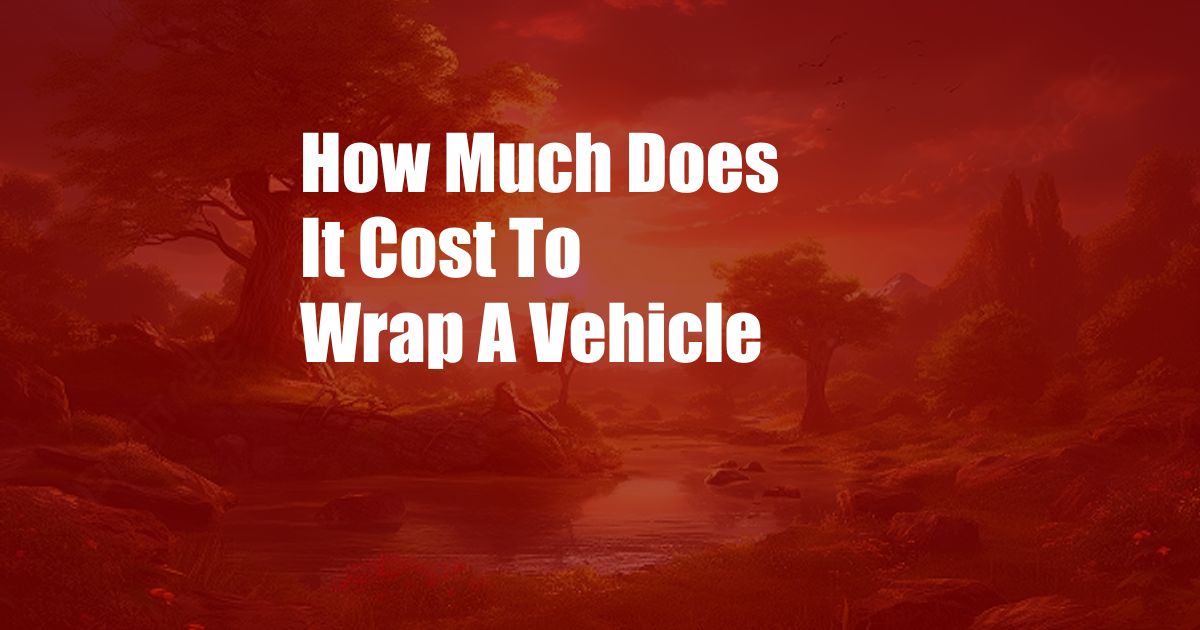
How Much Does It Cost to Wrap a Vehicle?
As a kid, I was always fascinated by the colorful, eye-catching designs on race cars. Little did I know that this art form would later become my profession as a vehicle wrapper. Over the years, I’ve transformed countless vehicles, from sleek sports cars to massive commercial trucks, giving them a unique and unforgettable look.
One of the most common questions I get asked is, “How much does it cost to wrap a vehicle?” It’s a valid question, considering that a wrap can significantly alter the appearance of your ride. In this article, I’ll dive into the factors that influence the cost of a vehicle wrap and provide you with a comprehensive breakdown of the expenses involved.
The Anatomy of a Vehicle Wrap
Before we delve into the costs, let’s take a closer look at the components that make up a vehicle wrap.
**Materials:** The type of material used for the wrap plays a major role in determining the price. Vinyl wraps are the industry standard, offering durability, color accuracy, and a wide range of finishes. The thickness and quality of the vinyl will also affect the cost.
**Design:** The complexity of the design is another significant factor. Simple, single-color wraps are less expensive than intricate, multi-colored designs with gradients or images. Custom designs, especially those involving artwork or photography, may require additional fees for graphic design services.
Factors Influencing the Cost of a Vehicle Wrap
Now that we have a basic understanding of the materials and design involved, let’s explore the factors that influence the cost:
- Size of the Vehicle: Larger vehicles, such as vans and trucks, require more material and time to wrap, resulting in a higher cost.
- Shape of the Vehicle: Complex shapes, curves, and contours require more skill and precision to wrap, increasing the labor costs.
- Type of Wrap: Full wraps, which cover the entire vehicle, are more expensive than partial wraps, which cover only specific sections.
- Labor Costs: The experience and skill of the installer will affect the cost. Reputable installers often charge higher rates for their expertise.
- Location: The cost of living and labor rates in different regions can impact the overall price of the wrap.
Costs Associated with a Vehicle Wrap
Based on the factors discussed above, here’s a comprehensive breakdown of the costs associated with a vehicle wrap:
- Materials: Vinyl material can range from $3 to $10 per square foot, depending on the thickness and quality.
- Design: Custom design services can cost anywhere from $50 to $500, depending on the complexity of the design.
- Printing: The printing process can add $2 to $5 per square foot to the total cost.
- Labor: Installation costs vary widely depending on the factors mentioned earlier, but generally range from $500 to $2,000.
Latest Trends and Developments
The vehicle wrap industry is constantly evolving, with new materials and techniques emerging all the time. One notable trend is the use of digital printing, which allows for high-quality, photorealistic images to be printed directly onto the vinyl.
Another exciting development is the advent of wrappable chrome finishes. These wraps mimic the look of chrome but without the high cost and maintenance of traditional chrome plating.
Tips and Expert Advice
Based on my experience as a vehicle wrapper, here are a few tips to help you get the best value for your money:
- Choose a reputable installer: Experience and skill make a big difference in the quality of the wrap and its longevity.
- Compare quotes: Get quotes from multiple installers to find the best price for your project.
- Consider partial wraps: If you’re on a budget, consider wrapping only specific sections of your vehicle, such as the hood or doors.
- Negotiate: Don’t be afraid to negotiate with installers. They may be willing to offer discounts for bundled services or large projects.
In addition to these tips, I highly recommend doing your research. Visit online forums, read reviews, and talk to other vehicle owners who have recently had their vehicles wrapped.
FAQs
Q: How long does a vehicle wrap last?
A: The lifespan of a vehicle wrap can vary depending on the quality of the materials used and the care taken to maintain it. Typically, a high-quality wrap can last anywhere from 5 to 7 years.
Q: Can I wrap my vehicle myself?
A: While it is possible to wrap your vehicle yourself, it is highly recommended to hire a professional installer. Vehicle wrapping requires specialized skills and techniques to achieve a flawless finish.
Q: Is it worth it to wrap my vehicle?
A: Whether or not it is worth it to wrap your vehicle depends on your individual needs and preferences. A wrap can enhance the appearance of your vehicle, protect its paint, and increase its resale value. However, it is important to factor in the cost and maintenance involved.
Conclusion
Wrapping your vehicle can be a great way to transform its appearance, protect its paint, and increase its visibility. By understanding the factors that influence the cost, choosing a reputable installer, and following the expert advice provided in this article, you can ensure that you get the best value for your money and a wrap that meets your expectations.
Now, I’d love to hear from you. Are you considering wrapping your vehicle? Let me know in the comments below, and I’ll be happy to answer any questions you may have.